
Against the sporadic drumbeat of explosions, an electric buggy riddled with bullet holes ferries the elderly and their bags across the ravaged territory that is now the main way out of Jenin and its refugee camp.
Behind them, Palestinian families carry their children and suitcases along the dirt road bulldozed by the Israeli military in their operation they say is against militants in the occupied West Bank city.
Among them is eight-year-old Asmaa, in a pink jumper, clutching a baby goat that she says her family rescued on their way out. A little ahead is Lutifyeh, a mother-of-12 in her sixties, who says they all fled after Israeli drones fitted with speakers that morning ordered them to leave immediately.
“The refugee camp is empty. We have no place to go. There was bombing and bulldozers as we came out,” Lutifyeh says, in tears. “My family has been here since 1948, for 70 years. We have no place but this house. Where shall we go? There is nothing there.
“I’m afraid that, yes, there is a ceasefire in Gaza but there is a new war here.”
Families in Gaza and those of the hostages from Israel celebrated a ceasefire between Israel and the Hamas militant group, hoping it would herald an end to a ruinous 15-month conflict, the return of hostages and detainees, and maybe even usher in a permanent peace.
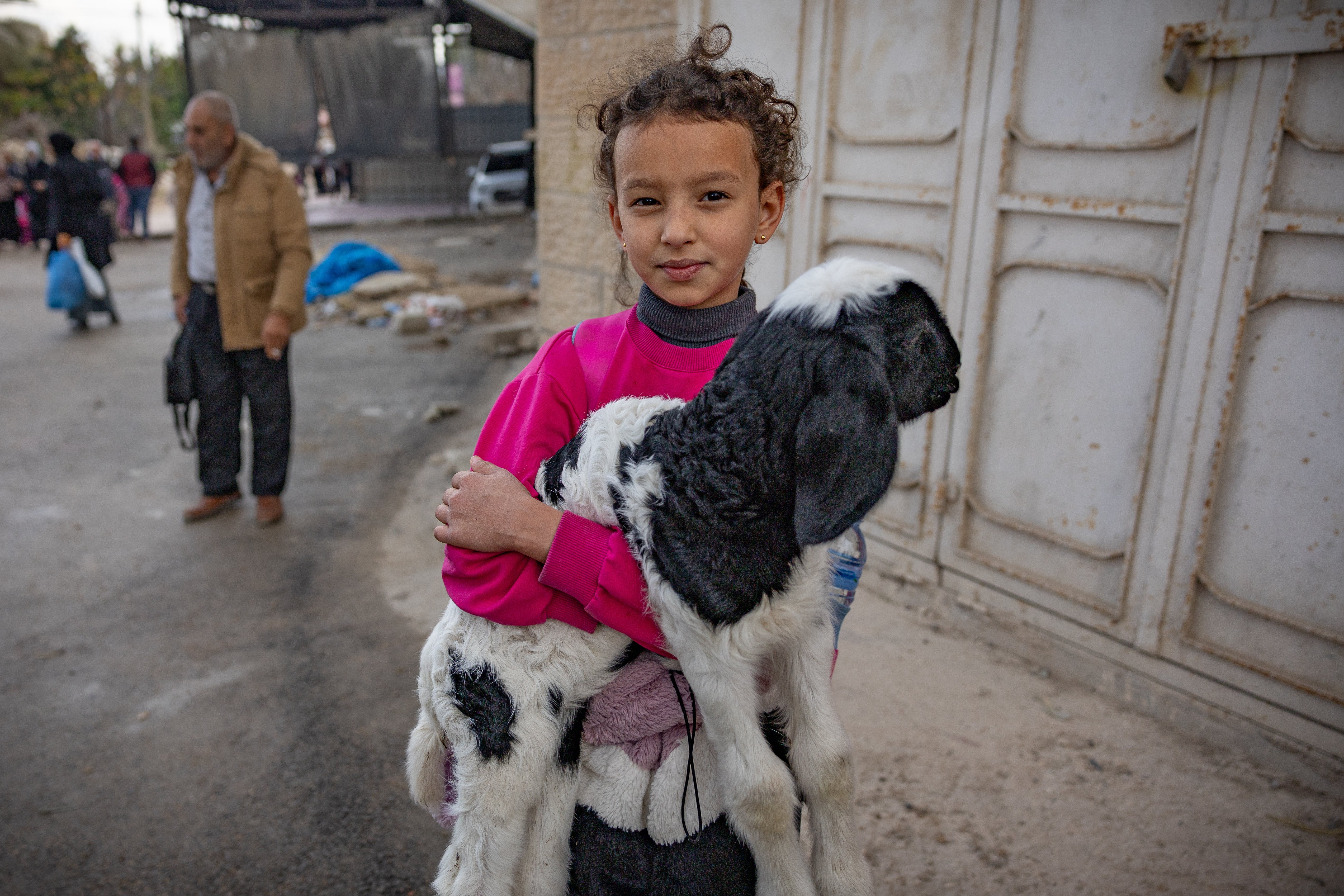
But just three days into the agreement, Israel announced the start of a “major counter-terrorism” operation in northern parts of the occupied West Bank. The focus is Jenin and its refugee camp, which has increasingly become a stronghold for Palestinian militants loyal to Hamas and Palestinian Islamic Jihad but is also home to thousands of civilians.
Jenin had just been the battleground of a weeks-long operation by security forces of the Palestinian Authority – controlled by Fatah, the rival faction to Hamas – which wanted to reassert control over the city before the Israeli offensive. And so many fear that rather than the ceasefire being the beginning of the end of the violence in the region, the theatre of war has shifted to the West Bank.
Israel has occupied the West Bank of the Jordan River, which Palestinians want as the core of an independent state, since the 1967 Middle East war. It has built Jewish settlements that are illegal under international law and widely condemned internationally. Israel disputes this and cites historical and Biblical ties to the land.
In recent years, with an increasingly extreme right-wing government that includes ministers who are settlers themselves, Israel has expanded its settlement programmed, forced displacement of Palestinians, and military-level raids. Violence from militants has also surged.
Since the Gaza ceasefire has come into effect, columns of Israeli military vehicles, backed by helicopters and drones, have pushed into and pounded Jenin – a level of “unlawful force” that the UN High Commissioner for Human Rights, Thameen Al-Kheetan, said on Friday involves “methods and means developed for war fighting”.
“This includes multiple airstrikes and apparently random shooting at unarmed residents attempting to flee or find safety,” he warned.
“It is very concerning that what’s happening today in the West Bank may have an impact on the ceasefire in Gaza. It is imperative that the ceasefire in Gaza holds.”
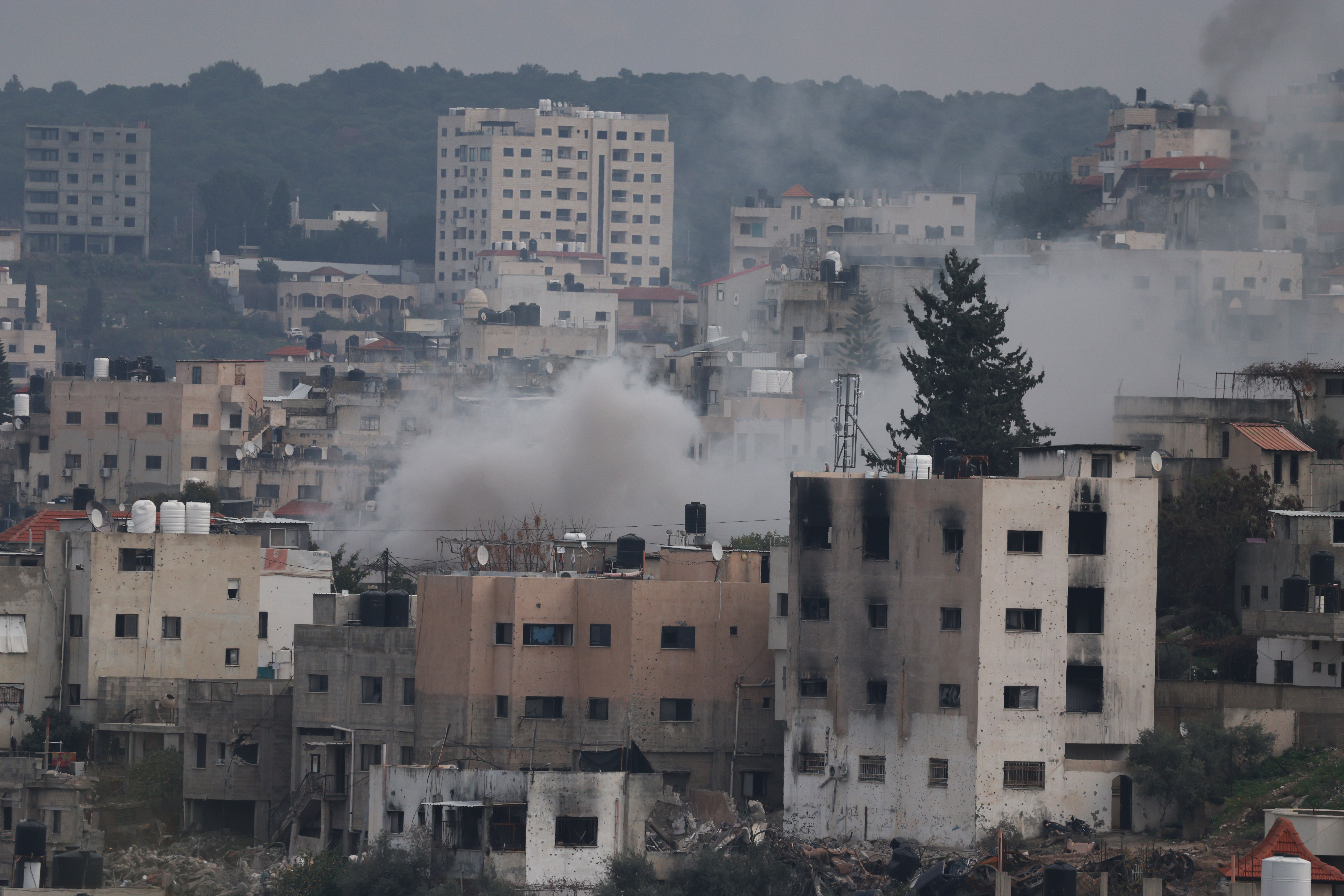
Palestinian health officials said that since the Israeli operation, at least 12 people have been killed in Jenin, including medics and a 43-year-old father who was reportedly shot dead while driving his children in a car. The deputy governor of Jenin told local media this week that at least half of the 18,000-strong population of the refugee camp has fled. Rights groups like Action Aid have said the refugee camp is “experiencing the hardest days of its existence.”
On Friday, the Israeli military said it was widening its operation to include an additional town in the Jenin area, adding that they had “eliminated” 10 militants and apprehended 20 “wanted suspects” in total. A day later the Palestinian health ministry said Israeli forces had shot dead a two-and-half-year-old baby girl and injured her pregnant mother in a village outside of Jenin, an incident the Israeli military said “It was investigating” In a statement to The Independent, the military denied using issuing evacuation orders, using excessive force or targeting civilians, adding that it “follows international law and takes feasible precautions to mitigate harm to uninvolved individuals”.
“We need to be prepared to continue in the Jenin camp, which will bring it to a different place,” Lieutenant General Herzi Halevi, head of the Israeli military, said in a recent situation assessment about the operation.
The director of the Israeli Security Agency, Ronen Bar, said that Israel is “in a multi-front campaign – but right now, it’s [the northern West Bank’s] time.”
Security sources told Israeli media that the operation could “go on for months”.
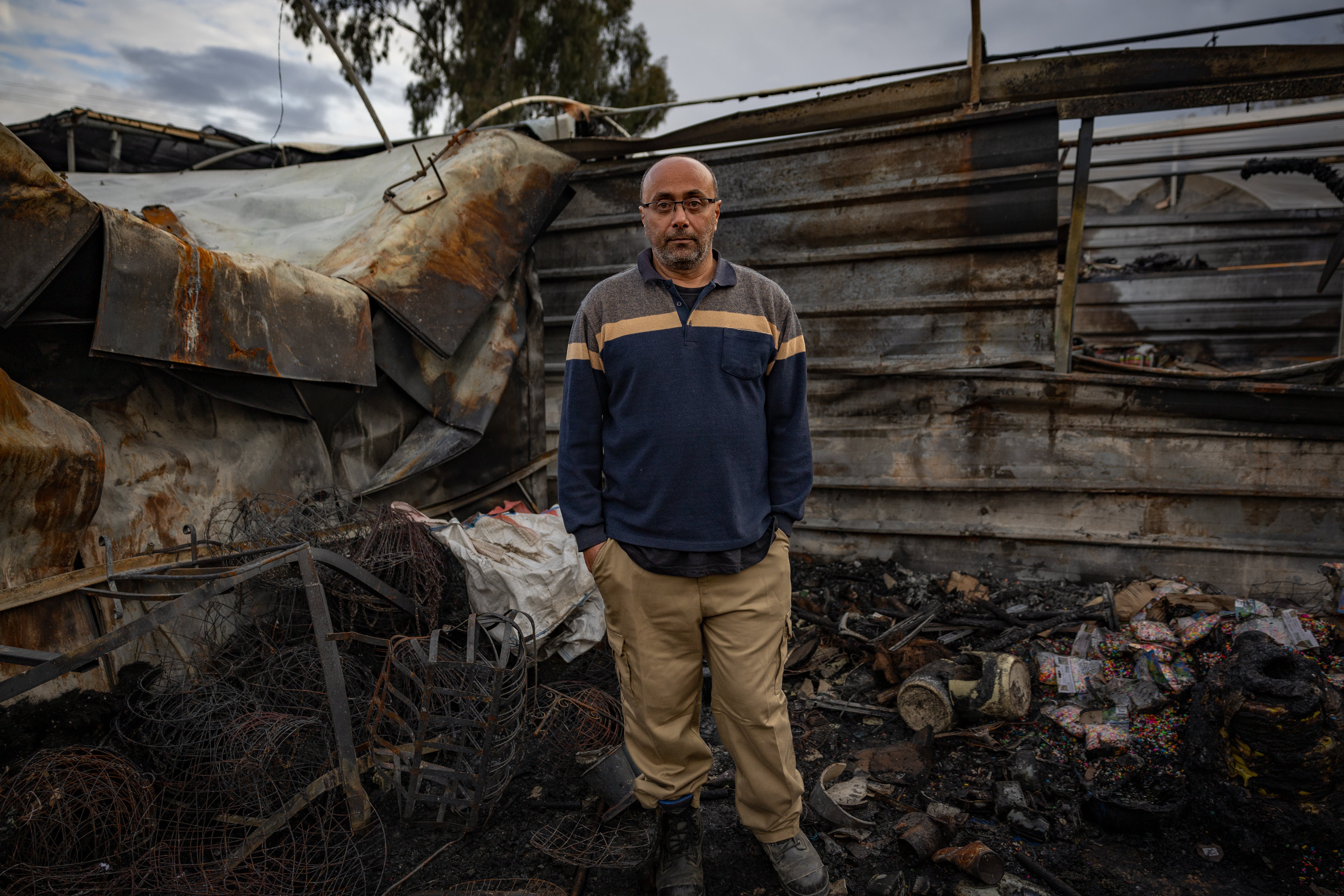
Violence has, meanwhile, soared across other parts of the West Bank. Around 60km (37 miles) south, in a Palestinian town called Funduq, local mayor Loay Taym echoes fears about Israel’s intentions for a new war in the West Bank.
He picks his way through the torched remains of a garden centre, destroyed when dozens of masked Israeli settlers raided the Palestinian town and set fire to buildings and cars on Monday. In total, 21 people were injured including a Palestinian father who was beaten up by a gang when he tried to protect his wife and six-month-old child.
“We feel that after the Gaza ceasefire, the right-wing government did not achieve whatever the goals they had in mind,” Taym says, surrounded by destruction. “So they might intensify their attacks in the West Bank and they call it some kind of different victory here.”
Earlier in January, Palestinian gunmen killed three Israelis, including two elderly women, further down this street. The Israelis identified the assailants as being Hamas militants from the Jenin area and said they were “eliminated” on Wednesday in a town adjacent to the city.
Taym says he can only assume the settlers in nearby settlements decided to exact revenge on his hamlet of 1,400 people, despite the fact they weren’t involved.
“The people of Funduq didn’t know about the killing of the three Israelis. We couldn’t stop it, we had no idea about it,” he says in desperation, amid melted garden pots. “Funduq is known as a commercial and trade area for everyone. The stores here all have Hebrew and Arabic signs. Both settlers and Arabs come here to buy what they need peacefully.”
Funduq and neighbouring Jinsafut, which was also attacked on Monday, are located in Area C, which makes up 60 per cent of the West Bank and is under Israeli civilian and security control. The Independent witnessed Israeli soldiers stationed at multiple points in Funduq. Taym says earlier in January, dozens of soldiers forced him out of his own flat, which they occupied for two weeks, leaving him homeless.
But according to Taym and other residents, the soldiers “did nothing” when the settler attack happened, and Israeli border police only arrived an hour into the violence.
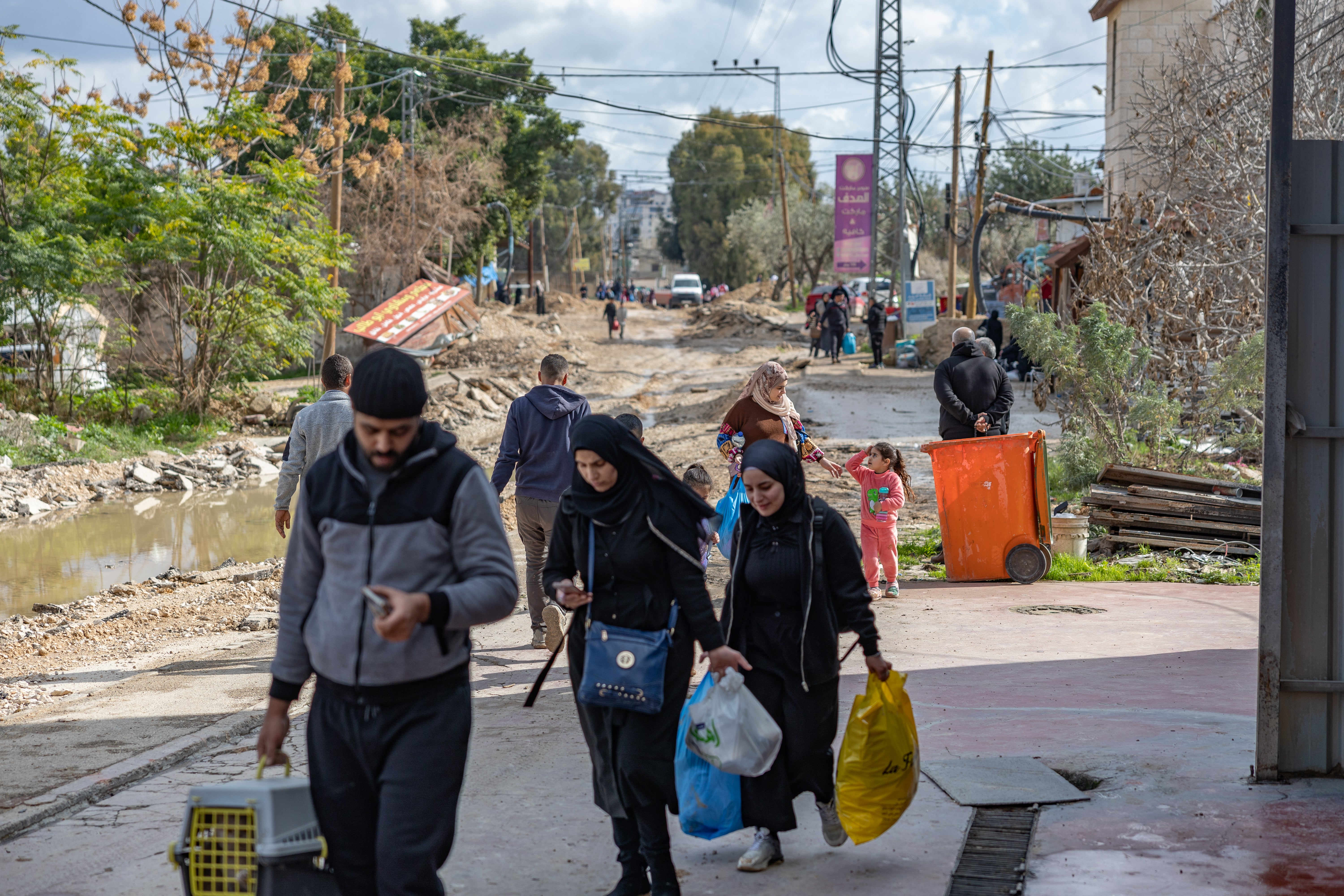
Jalal Bashir, head of Jinsafut council, says he fears more attacks are on the horizon, especially as Monday’s violence occurred just hours before newly inaugurated US president Donald Trump announced he was rescinding Joe Biden’s sanctions on extremist settlers.
He fears Trump’s order gives settlers a carte blanche to use violence and that they have been emboldened by extreme-right members of the Israeli government, like finance minister Bezalel Smotrich, a settler himself who lives in Kedumim, the settlement right next to Funduq and Jinsafut.
“Our feeling is that what is coming is going to be worse,” says Bashir.
“We’re worried this will happen again. We don’t sleep at night, we have to keep watch,” Taym adds. “You don’t know when the next attack is coming. Everybody has kids in their house.”
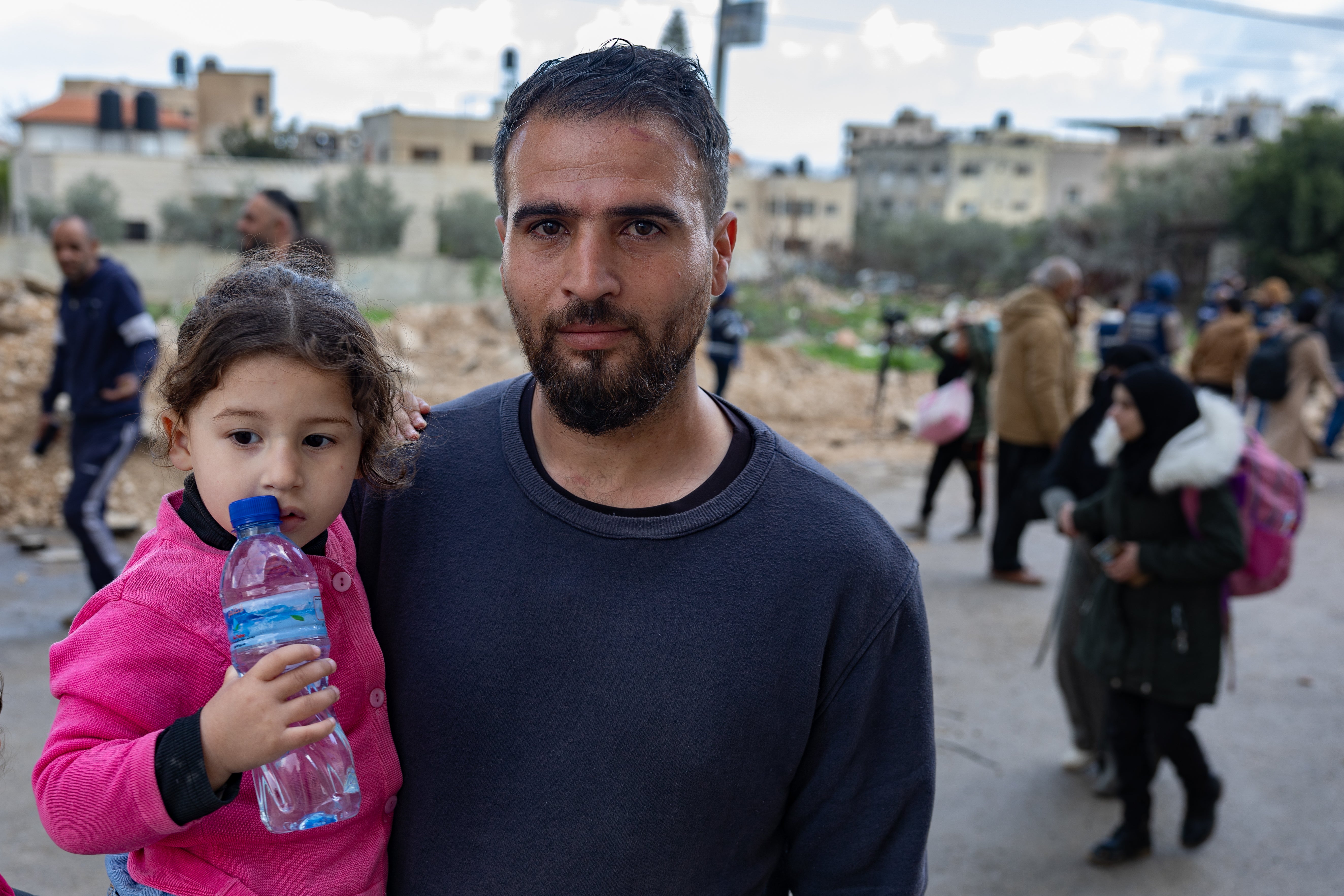
Back in Jenin, hundreds of civilians, who have endured weeks of violence and electricity and water cuts from military operations, stream out of the city with whatever belongings they can in the chaos.
Qahira Saadi, a mother-of-two, says her two adult sons and her husband have been stopped and detained at the checkpoint on their way. “We don’t know where they were taken,” she says in tears.
Saddam Jarboa, 34, meanwhile, who is fleeing with his four children, says all they can take with them is a few of their children’s backpacks. This is the second time they have had to evacuate – they last fled an Israeli raid in July. But this time, he says, he fears it will be worse.
“The Israelis bulldozed my entire family’s car-washing business the day before yesterday,” he says, holding his youngest child, just a few years old, in his arms. “What hope is there? They have destroyed literally everything.”
* Additional reporting by Rateb Qaissy







